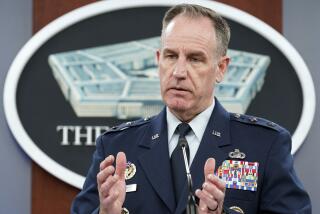Lax Pension Plan Audits Criticized : Congress: Report will warn that many funds are never examined. Some accountants are allowed to skip scrutiny of key areas.
- Share via
WASHINGTON — Nearly half of all pension plan assets are never audited, making the funds dangerously vulnerable to fraud and theft, the Labor Department inspector general will tell Congress today.
A special investigative report says pension plan administrators frequently tell their auditors to skip the investigation of billions of dollars in assets held in banks and other financial institutions.
The disturbing report is the most widespread finding to date of inadequate supervision of the nation’s pension plans, which cover 66 million workers and contain nearly $2 trillion in assets.
The protection of pension assets has become the subject of an intense dispute between the acting inspector general, Raymond Maria, and other top officials of the Labor Department. Maria has warned that oversight of pension plans is inept, and has predicted scandals on the scale of the multibillion-dollar collapse of savings and loan associations. Labor Department officials and pension industry executives denounced him as an alarmist.
Maria will tell a congressional hearing today that his staff selected a sample of 279 pension plans, with assets of $9.8 billion, and found that 43% of the assets, or $4.2 billion, had never been audited.
The result is “inadequate protection for plan participants and their beneficiaries,” according to a report Maria will present to a hearing of the pension subcommittee of the House Select Committee on Aging. A copy of the report was obtained by The Times.
Federal law protecting pensions calls for regular auditing of pension plans, but this requirement is frequently ignored. The Labor Department’s Pension and Welfare Benefits Administration rarely takes enforcement action against accountants for lax or inept review of pension funds, according to the study by Maria, a former FBI agent.
“Currently, there is no enforcement activity and there is little incentive for independent public accountants to improve their work,” the report says. “Little oversight exists, enforcement is minimal. . . .” Moreover, the Labor Department “has not used the enforcement authority it has over plan administrators.”
Current regulations permit pension plan administrators “to tell auditors to skip the testing of assets held in trust by banks and other regulated financial institutions,” the report says.
This means the independent accountants hired by the pension plan are permitted to do a limited audit and may “disclaim any opinion as to whether the financial statements are correct,” the report notes. “What comfort can a ‘no opinion’ audit give plan participants or trustees?”
Plan administrators were given authority to limit the intensity of audits because it was believed that banks, S&Ls; and other financial institutions “were heavily audited by the federal government,” the report notes. “While this may have once been true, it is not true today,” the study says.
Bank audits by the Federal Deposit Insurance Corporation were conducted annually, but are now performed every two years. The Comptroller of the Currency’s office, which audits national banks, has only 50 trust specialists skilled in examining pension plan assets. Several years ago, there were 2,500 trust specialists, the report says.
S&Ls; have been entering the trust business in increasing numbers, offering their services to pension plans. But until very recently, the federal S&L; regulatory staff “had no trust specialist or audit procedures in place for examinations of savings and loan trust departments,” according to the report.
The inspector general’s report condemns most independent accountants’ reports on pension plans as virtually useless.
Most plan audits took less than 40 hours, too short a time to do an effective job, the report says. “Also some firms claimed to have charged the (pension plan) sponsor very little, or in one instance nothing, for the audit. Certainly this would discourage spending the necessary time to perform a comprehensive audit.” Maria’s report calls on both Labor Department regulators and accountants to improve their performance in obtaining detailed information about the health of pension plan assets. Otherwise, Congress should do the job, he recommends.
If the Labor department “or the accounting profession does not provide the (employee) protections administratively, Congress may legislate more controls,” the report says.
The money in pension funds “needs a substantial amount of protection to minimize abuse and mismanagement,” according to the report.
More to Read
Get the L.A. Times Politics newsletter
Deeply reported insights into legislation, politics and policy from Sacramento, Washington and beyond. In your inbox twice per week.
You may occasionally receive promotional content from the Los Angeles Times.










